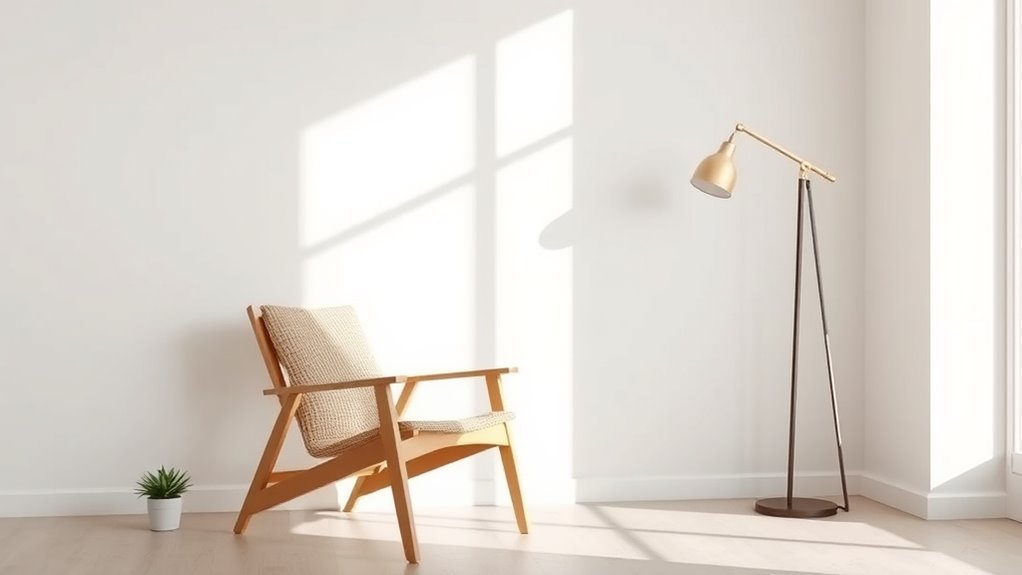Embracing minimalism helps you live more sustainably by reducing clutter and making intentional choices that benefit the environment. When you prioritize quality over quantity, use eco-friendly habits like reusable bags and water conservation, and design your space simply, you decrease waste and resource consumption. This mindful approach not only supports sustainability but also creates a calmer, more focused living environment. Discover how minimalism can transform your life and help the planet as you explore further.
Key Takeaways
- Simplifying possessions reduces resource consumption and manufacturing impact, promoting environmentally sustainable living.
- Minimalist design emphasizes durable, versatile items that support long-term eco-friendly habits.
- Living with less decreases waste and impulse buying, contributing to a smaller ecological footprint.
- Incorporating eco-friendly habits like reusing and conserving water enhances sustainability efforts.
- Minimalism fosters mindful consumption, aligning personal well-being with environmental preservation.

Have you ever wondered how simplifying your life can positively impact the planet? Adopting a minimalist lifestyle encourages you to focus on what truly matters, reducing clutter and excess. One of the key ways to do this is by cultivating eco friendly habits that not only benefit the environment but also improve your quality of life. Small changes, like switching to reusable bags, reducing single-use plastics, or conserving water, can make a significant difference over time. These habits promote mindful consumption, helping you avoid impulse buys and unnecessary waste. It’s about making intentional choices that minimize your ecological footprint and foster sustainability. Incorporating eco friendly habits into your daily routine can further amplify your positive impact on the environment. Minimalist design plays a pivotal role in this journey. When you embrace minimalist aesthetics, you create spaces that are simple, functional, and free of clutter. This approach emphasizes quality over quantity—opt for durable, timeless pieces rather than disposable or trendy items. Minimalist design encourages you to choose versatile furniture and decor that serve multiple purposes, which reduces the need for excess possessions. By keeping your environment clean and organized, you’re more likely to maintain eco friendly habits because everything has a designated place, making it easier to care for and less likely to be discarded prematurely. Creating organized spaces not only supports sustainability but also enhances your mental clarity, making it easier to stick to your eco-conscious routines. It’s about creating a calm, intentional space that supports your sustainable lifestyle. Living with less isn’t about deprivation; it’s about shifting your perspective to value sustainability and mindful consumption. When you reduce your possessions, you lessen the demand for resource-intensive manufacturing and transportation, which directly impacts the planet’s health. Minimalism also helps you avoid impulse purchases fueled by consumer culture, encouraging you to invest in quality items that last longer. This mindset aligns perfectly with eco friendly habits—by choosing products that are ethically made and environmentally friendly, you support sustainable practices. Over time, these small, consistent choices add up to a significant positive impact on the environment. Additionally, embracing minimalist design principles can inspire you to make more eco-conscious decisions in all areas of your life. For example, adopting a celebrity-inspired minimalist aesthetic can motivate you to focus on quality and longevity in your possessions. Recognizing the importance of product durability can help you select items that reduce waste and last through extensive use. In essence, embracing minimalism for sustainability empowers you to live more intentionally. It’s about creating a life that’s less focused on material accumulation and more aligned with environmental stewardship. As you develop eco friendly habits and adopt minimalist design, you’ll find yourself feeling more grounded, less stressed, and more connected to your surroundings. Your home becomes a reflection of your values—simple, functional, and respectful of the planet. Living more with less isn’t just a trend; it’s a meaningful way to contribute to a healthier, more sustainable world while enjoying a more peaceful, clutter-free life.
Frequently Asked Questions
How Does Minimalism Impact Household Energy Consumption?
Reducing your household energy consumption helps lower your carbon footprint and saves money. You can achieve this by using energy-efficient appliances and smart home technology, which optimize energy use. Minimalism encourages you to declutter and focus on essential items, making it easier to maintain an energy-conscious lifestyle. By simplifying your space and choices, you naturally reduce waste and consumption, making your home more sustainable and eco-friendly.
Can Minimalism Help Reduce Personal Carbon Footprints Effectively?
Your carbon footprint can shrink dramatically with mindful lifestyle choices, proving that even small changes matter—like a ripple creating a wave. Minimalism helps you reduce excess consumption, cutting down on waste and energy use. By simplifying your life, you lower your environmental impact and live more sustainably. Embracing minimalism means you actively contribute to a healthier planet, proving that less truly can be more for the environment.
What Are Common Challenges When Adopting a Minimalist Lifestyle for Sustainability?
When adopting a minimalist lifestyle for sustainability, you might face challenges like changing ingrained consumer habits and overcoming emotional attachment to possessions. These habits can make it hard to let go of unnecessary items or resist impulse buying. You need to consciously shift your mindset, focus on quality over quantity, and find new ways to appreciate simplicity. Overcoming emotional ties and modifying consumer habits are key steps to embracing minimalism sustainably.
How Does Minimalism Influence Waste Generation and Recycling Habits?
Minimalism reduces waste generation by encouraging you to focus on clutter reduction and sustainable purchasing. When you buy less, you create less trash and avoid unnecessary packaging. You become more mindful of your consumption, which leads to better recycling habits. By prioritizing quality over quantity, you naturally extend the lifespan of your belongings, making it easier to recycle or repurpose items, ultimately supporting a more sustainable lifestyle.
Are There Cultural Differences in Minimalism Approaches for Sustainability?
Like a tapestry woven with diverse threads, cultural differences shape minimalist approaches for sustainability. You’ll see varied practices driven by regional values and customs, influencing how people declutter or reduce consumption. For example, some cultures prioritize community sharing, while others emphasize individual simplicity. These cultural practices make minimalist lifestyles unique worldwide, highlighting that what works in one region might differ in another, but all aim to live more intentionally and sustainably.
Conclusion
So, by embracing minimalism, you might just find that living with less actually gives you more—more clarity, more freedom, more meaning. Ironically, in trying to save the planet, you’re also saving yourself from clutter and chaos. It’s a small sacrifice for a big reward, yet it’s often the tiniest lifestyle change that has the greatest impact. Who knew that doing less could truly help you live more?










